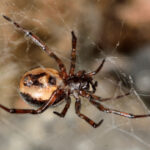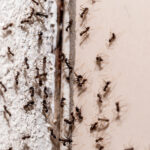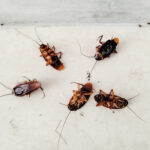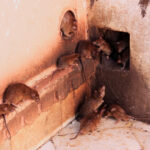Common Basement Pests and How to Prevent Them
- Common Basement Pests and How to Prevent Them
Common Basement Pests and How to Prevent Them
Basements are one of the most common areas in a home where pests take up residence. The dark, damp, and often cluttered environment provides the perfect conditions for a wide variety of pests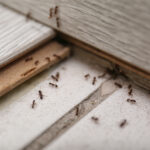
Why Basements Attract Pests
The unique conditions in basements make them a magnet for pests. Several factors, including excess moisture, abundant food sources, and dark, hidden spaces, contribute to making basements ideal habitats for insects and rodents.
Excess Moisture
Dampness is one of the primary factors that attract pests to basements. High moisture levels, often caused by poor ventilation or leaks, create a humid environment that many pests find irresistible. Water seeping into cracks, condensation, and leaks from pipes are just a few sources that can lead to persistent moisture problems.
Certain pests like silverfish, cockroaches, and centipedes are drawn to damp environments. They seek moisture for survival and can thrive and reproduce more rapidly in wet conditions.
How to Prevent Excess Moisture:
- Fix leaks or any plumbing issues that cause water buildup.
- Improve ventilation by installing fans or vents to promote airflow.
- Use a dehumidifier to maintain appropriate moisture levels.
- Properly seal cracks in walls and floors to prevent water infiltration.
Available Food Sources

Stored food items or pantry products are prime targets for pests seeking an easy meal. Rodents and insects, in particular, can find and access these sources and spread throughout the basement.
How to Limit Food Sources:
- Store food in airtight containers made of durable materials like plastic or glass.
- Regularly clean up crumbs and food spills.
- Avoid leaving pet food or water dishes in the basement.
- Inspect and declutter stored items to reduce hiding and feeding areas for pests.
Dark, Hidden Areas
Basements are often dimly lit, and this darkness provides a perfect refuge for pests. Rodents, insects, and spiders love the secluded nature of dark basements, which offer them security from predators and disturbances. They can establish nests and colonies without detection, making it harder to manage infestations once they take root.
Spiders, for example, use these dark areas to spin webs and catch insects, which serve as their primary food source. Insects like cockroaches and silverfish are also attracted to dark areas for protection and reproduction.
How to Manage Dark Areas:
- Keep your basement well-lit by installing additional lighting or using motion-sensor lights to deter pests.
- Clear out clutter to eliminate potential hiding spots.
- Store items in clear, sealed bins to minimize dark, enclosed spaces.
Recognizing Common Basement Pests
Basements are home to a variety of pests, each with its own characteristics and challenges. Being able to identify the pests in your basement is crucial to taking effective action. Below are some of the most common basement pests and how to recognize them.
Spiders
Spiders are perhaps one of the most common pests found in basements. While most species are harmless to humans, their presence can still cause unease. Basements offer spiders plenty of hiding places, such as behind boxes, in corners, and along window sills, where they can spin webs to catch prey.
Prevention Tips:
- Use citrus peels or vinegar.
2. Keep the area clean to remove webs and insects.
3. Use essential oils like peppermint, which can act as natural repellents.
Ants
Ants are another frequent invader in basements, especially if they find a reliable food source. They can enter through even the tiniest cracks, and once inside, they’ll establish a colony and scout for food sources, particularly sugars and proteins.
– Use salt, vinegar or baby powder.
– Keep food sealed and clean up spills promptly.
– Address moisture issues that may attract ants.
Cockroaches
Cockroaches are among the most dreaded pests due to their resilience and the health risks they pose. These nocturnal creatures are attracted to damp, dark environments and can spread diseases by contaminating food and surfaces with bacteria.
– Keep the basement dry by fixing leaks and using a dehumidifier.
– Regularly clean to avoid clutter and hiding spots.
– Use roach baits and traps to monitor and reduce cockroach populations.
Centipedes and Millipedes
Centipedes and millipedes are often found in damp, dark environments like basements. Though they aren’t particularly harmful, their presence in large numbers can be unsettling. Centipedes are fast-moving predators that feed on other insects, while millipedes are more likely to feed on decaying plant matter.
– Address moisture issues by fixing leaks and improving ventilation.
– Seal cracks and gaps to prevent entry.
– Remove organic material, such as decaying wood or plant matter, that can attract these pests.
Rodents
Rodents, such as mice, rats and squirrels, are another common issue in basements. They are drawn to basements because they offer shelter and access to food sources. Rodents can cause significant damage by chewing through insulation, wiring, and wood and can also carry diseases. With rodents being among the most common pests across the UK, we have a complete guide to help you prevent rodents from your property.
– Seal off entry points, particularly around pipes, vents, and cracks in walls.
– Keep the basement clean and free of food sources.
– Ensure that food and garbage within your home are securely sealed.
Why It’s Crucial to Tackle Basement Pest Problems Early
Addressing pest problems early is crucial for several reasons:
- Pests Multiply Quickly: Many pests, including mice and insects, reproduce at a rapid rate. What begins as a small infestation can grow exponentially within weeks.
- Prevents Structural Damage: Rodents and insects can damage wood, insulation, and wiring, leading to costly repairs. For instance, carpenter ants can compromise your home’s structural integrity if the infestation gets out of control.
- Health Risks: Pests like cockroaches and rodents can carry diseases that pose a threat to your family’s health.
- Save Money on Long-Term Pest Control: Early intervention is often more affordable than dealing with a full-blown infestation that requires extensive treatment.
Effective Strategies to Keep Your Basement Pest-Free
To maintain a pest-free basement, adopting a combination of preventive measures is essential.
Seal Gaps and Cracks
Sealing gaps and cracks in walls, floors, and around windows and doors will significantly reduce the chances of pests entering your basement.
Clear Out Clutter
A cluttered basement provides pests with ample hiding spots. Regularly decluttering your basement will reduce the number of places pests can nest.
Maintain Cleanliness
Maintaining cleanliness in the basement by sweeping, vacuuming, and cleaning up spills will reduce the food sources and shelter pests seek.
Regularly Inspect for Pest Activity
Regularly inspecting your basement for signs of pest activity, such as droppings, chewed materials, or dead insects, can help you detect an infestation early before it becomes unmanageable.
Natural Remedies to Repel Pests
For homeowners who prefer to avoid chemical pesticides, several natural remedies can help repel pests.
Vinegar-Based Solutions
Vinegar is an excellent natural cleaner and pest repellent. Its strong smell and acidic properties make it a good deterrent for ants, spiders, and other insects.
How to Use:
– Mix equal parts vinegar and water in a spray bottle and use it to clean surfaces, windowsills, and doorways to repel pests.
Essential Oils
Essential oils such as peppermint, eucalyptus, and lavender are well known for their pest-repelling properties.
How to Use:
– Add a few drops of essential oil to a spray bottle filled with water and spray it in areas where pests are commonly found.
DIY Pest Sprays
Homemade pest sprays using simple ingredients like vinegar, essential oils, and garlic can be effective in repelling pests.
Example Recipe:
– Mix water, vinegar, and a few drops of peppermint oil in a spray bottle and apply it around your basement to keep pests away.
When to Seek Professional Help for Persistent Pest Problems
Despite your best efforts, some pest infestations may require professional help. If you notice that pests continue to return or that the infestation is too extensive to handle on your own, it’s time to call in a professional pest control service. Pest control professionals have the tools and expertise to deal with even the most challenging infestations safely and effectively.
Conclusion
Preventing pests in your basement requires a proactive approach that addresses the root causes—moisture, food, and shelter. By maintaining cleanliness, controlling moisture, sealing entry points, and utilizing natural repellents, you can create an inhospitable environment for pests. Taking preventive measures now will save you from the headache of dealing with larger infestations in the future.
Ready to Take Control of Your Basement Pest Problem?
Tired of battling basement pests on your own? Let Youngs Pest Control handle it for you! Our experienced team can provide a thorough inspection and long-lasting solutions to keep your home pest-free. Contact us today at 0161 776 9832 or email us at [email protected] for a free consultation and let us protect your basement from unwelcome guests.

